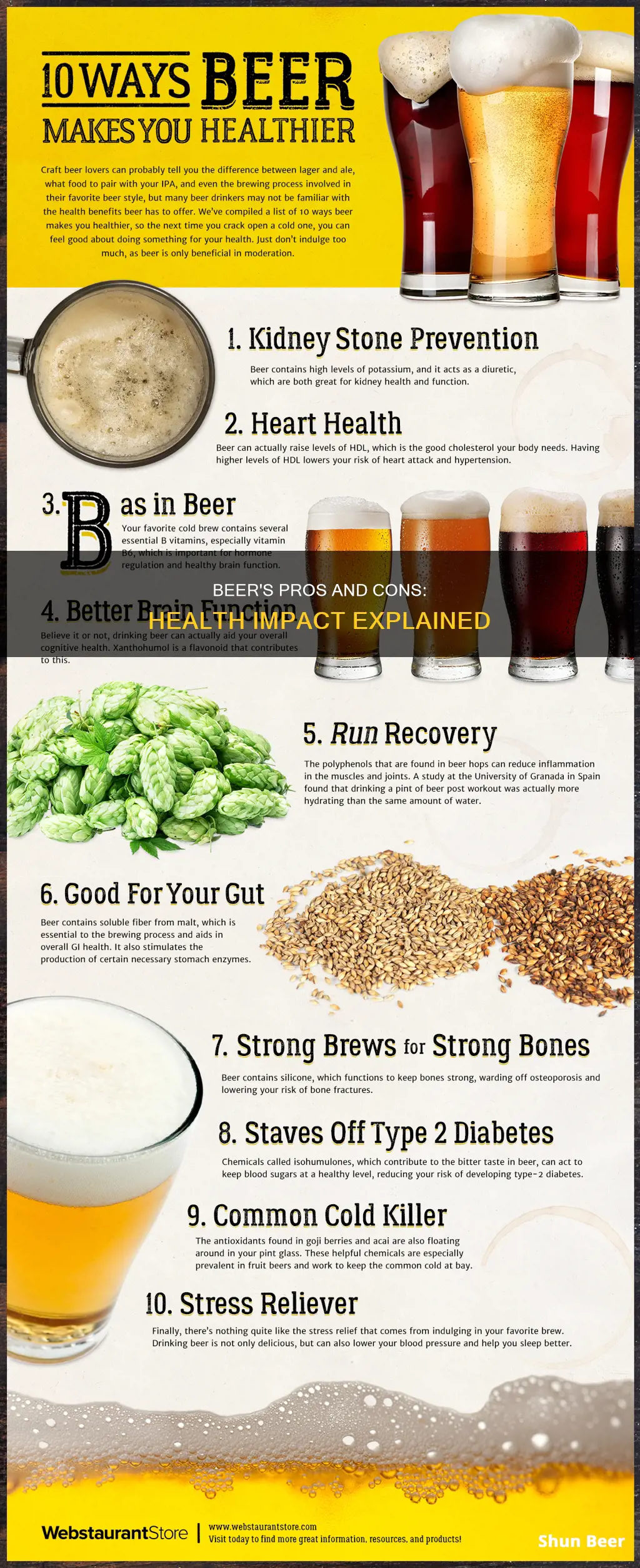
Beer is one of the oldest beverages in the world, and its consumption has been an integral part of human culture for thousands of years. While it is primarily valued for its refreshing qualities and unique taste, beer has also been the subject of debate regarding its advantages and disadvantages. This paragraph will explore the pros and cons of drinking beer, shedding light on its potential health benefits and drawbacks.
What You'll Learn

Beer is a rich source of vitamins and minerals
Beer is often viewed as a source of empty calories, but it does contain some vitamins and minerals. Beer is made from cereal grains and yeast, which is why it contains a variety of B vitamins and minerals.
Beer is a good source of B vitamins, particularly folic acid, which is believed to help prevent heart attacks. It also contains soluble fibre, which is good for digestive health. Beer also has significant levels of magnesium and potassium.
Additionally, beer is a source of antioxidants, with darker beers tending to have higher levels of antioxidants than lighter beers. Antioxidants fight free radicals in the body, reducing the risk of chronic conditions and certain forms of cancer.
While beer does contain vitamins and minerals, it is not a good source of these nutrients compared to whole foods like fruits and vegetables. You would need to drink large amounts of beer to meet your daily nutrient requirements, which would not be recommended due to the negative health effects of excessive alcohol consumption. Therefore, while beer can be a source of vitamins and minerals, it is important to consume it in moderation as part of a balanced diet that includes a variety of other nutrient-rich foods.
Beer and Leg Pain: Is There a Link?
You may want to see also

Beer can cause belly fat
Beer is often associated with an increase in body fat, particularly around the belly, giving rise to the term "beer belly". However, it is not solely beer that causes this, but rather the excessive consumption of calories and the resulting calorie overload. A typical beer contains about 150 calories, and drinking several in one sitting can lead to a significant calorie surplus.
Firstly, beer increases your overall calorie intake. Gram for gram, beer contains as many calories as a soft drink. Additionally, alcohol can stimulate your appetite, leading to increased food consumption. The foods commonly paired with beer, such as pizza, wings, and other fried foods, tend to be high in calories and fat.
Secondly, beer may hinder your body's ability to burn fat. When you consume alcohol, your liver prioritises breaking it down instead of burning fat. This can lead to an increase in body fat, especially when combined with excessive calorie intake.
Lastly, beer contains phytoestrogens, plant compounds found in hops that can mimic the female sex hormone oestrogen. While the effects of phytoestrogens on weight and belly fat are not fully understood, it has been suggested that they may cause hormonal changes in men, increasing their risk of storing belly fat.
While moderate consumption of one beer per day or less is not linked to developing a "beer belly", excessive drinking or regular binge drinking significantly increases the risk of belly fat and various other health problems. To minimise the risk of weight gain, it is essential to keep alcohol intake within recommended limits and maintain a healthy, active lifestyle.
Beer and Gout: Is There a Link?
You may want to see also

Beer is more affordable and has a lower alcohol content than other alcoholic drinks
Beer is a popular alcoholic beverage that has been consumed for thousands of years. While it is well-known that excessive alcohol consumption can lead to negative health effects and social issues, drinking beer in moderation has several advantages. One of the key benefits of beer is its affordability and lower alcohol content compared to other alcoholic drinks. Here are some paragraphs elaborating on this topic:
Beer is generally more affordable than other alcoholic drinks, making it a cost-effective option for social gatherings and celebrations. Its reasonable pricing also means that individuals can enjoy a drink without breaking the bank. This accessibility is further enhanced by its wide availability and the fact that it is served in larger volumes compared to wine or spirits. Beer's lower alcohol content, typically ranging from 4% to 6% but as low as 0.5%, makes it a more moderate choice. This is particularly advantageous for individuals who want to enjoy a drink without the strong intoxicating effects of other alcoholic beverages. The lower alcohol content also aligns with dietary guidelines for moderate alcohol consumption, which recommend one drink per day for women and up to two drinks per day for men.
The affordability and moderate alcohol content of beer can promote a culture of responsible drinking. By being more accessible in terms of cost and availability, beer can help reduce the risk of binge drinking and overconsumption. This is because individuals are less likely to engage in excessive drinking when the alcohol is not highly concentrated and is reasonably priced. As a result, beer can contribute to a healthier relationship with alcohol for those who choose to drink.
Beer's lower alcohol content also means that it can be enjoyed in social settings without the same level of impairment as stronger drinks. This makes it a good choice for individuals who want to relax and socialise without losing control of their inhibitions. The social aspects of moderate drinking are beneficial to overall well-being, providing opportunities for connection and relaxation with friends and peers.
However, it is important to recognise that beer's affordability and lower alcohol content can also have disadvantages. The accessibility of beer may lead to a higher risk of developing an addiction, as individuals may be more inclined to drink more frequently due to its lower cost and milder effects. Additionally, the social acceptability of beer as a casual drink may normalise excessive consumption, especially in cultures where drinking is a significant part of social gatherings. Therefore, while beer's affordability and lower alcohol content have their advantages, it is crucial to consume it responsibly and in moderation to avoid potential negative consequences.
Beer Overload: When Does Enjoyment Become Excess?
You may want to see also

Beer can improve cholesterol
Beer has long been called "liquid bread" because it typically contains barley malt, yeast, and hops. These substances contain phytosterols, which are plant compounds that bind to cholesterol and help remove it from your body. Phytosterols are sometimes added to foods and drinks and marketed as cholesterol-reducing.
However, the sterols found in beer are at such low levels that even whole-grain beer contains too little to significantly reduce cholesterol. In fact, beer can increase your triglyceride levels because it contains carbohydrates and alcohol, both of which quickly raise triglycerides. Since triglycerides are part of your total cholesterol count, this means that if your triglycerides increase, so does your total cholesterol.
Despite this, some research on mice has suggested that moderate beer consumption can reduce both cholesterol in the liver and cholesterol deposits in the aorta (the largest artery in the body). The researchers noted that some unidentified components in beer may change how lipoproteins are metabolised and reduce the risk of heart disease. However, what those components are and how they work is not yet fully understood.
Another large study showed that men who drank moderately (two drinks per day) were 30 to 35 percent less likely to have a heart attack when compared to people who didn't drink at all. This included men who drank beer, wine, or spirits.
Therefore, drinking beer in moderation may have some benefits for your heart health, but it is not a reliable way to improve your cholesterol. If you want to improve your cholesterol levels, getting regular exercise and following a diet that's low in simple sugars and alcohol are proven methods.
Beer and Angioplasty: What You Need to Know
You may want to see also

Beer can cause social misbehaviour
Beer is an alcoholic beverage that has been consumed for thousands of years and is often associated with social gatherings and celebrations. While it is typically consumed in moderation, excessive beer consumption can lead to negative consequences, including social misbehaviour. Here are some ways in which beer can contribute to social misbehaviour:
Impaired Judgement and Lowered Inhibitions: Beer, like any other alcoholic beverage, can impair judgement and lower inhibitions. This means that individuals who consume too much beer may engage in behaviours that they wouldn't typically exhibit when sober. This can include getting into fights, driving under the influence, or contributing to domestic violence. The disinhibiting effects of alcohol can lead to poor decision-making and a lack of control over one's actions, which can have harmful consequences for both the drinker and those around them.
Altered Mood and Behaviour: Alcohol has the ability to alter an individual's mood and behaviour. Beer consumption can lead to a range of emotional responses, from happiness and relaxation to aggression and irritability. In some cases, beer may act as a social lubricant, making individuals more outgoing and talkative. However, in other cases, it may lead to unpredictable behaviour, including violent outbursts or emotional breakdowns. These altered states can disrupt social harmony and lead to conflicts or uncomfortable situations within a group.
Intoxication and Loss of Control: Excessive beer consumption can lead to intoxication, where an individual loses control over their physical and mental faculties. Drunk individuals may experience slurred speech, impaired coordination, and make irrational decisions. They may engage in risky behaviours, such as drinking and driving, or become a danger to themselves or others. Intoxication can also lead to memory loss, where drinkers may not recall their actions or the consequences of their behaviour, further exacerbating social tensions and misunderstandings.
Addiction and Dependence: Beer, due to its widespread availability and relatively low cost, can be particularly susceptible to abuse and dependence. Individuals may find themselves craving beer more frequently and in larger quantities. This can lead to a loss of control over drinking habits, as the individual becomes increasingly dependent on alcohol. Alcohol addiction can severely impact an individual's social life, affecting their relationships, career, and overall well-being. It can also lead to financial difficulties, as the need for beer becomes more pressing.
Social Norms and Peer Pressure: In many social circles, drinking beer is considered a normal or even expected behaviour. This can create a sense of peer pressure, especially among younger individuals, to consume beer in order to fit in or be accepted by their peers. This pressure can lead to excessive drinking and a higher risk of social misbehaviour. Additionally, social norms surrounding drinking, such as drinking games or competitive drinking, can further encourage excessive consumption and increase the likelihood of negative social outcomes.
Beer and Amlodipine: Is It Safe to Drink?
You may want to see also







